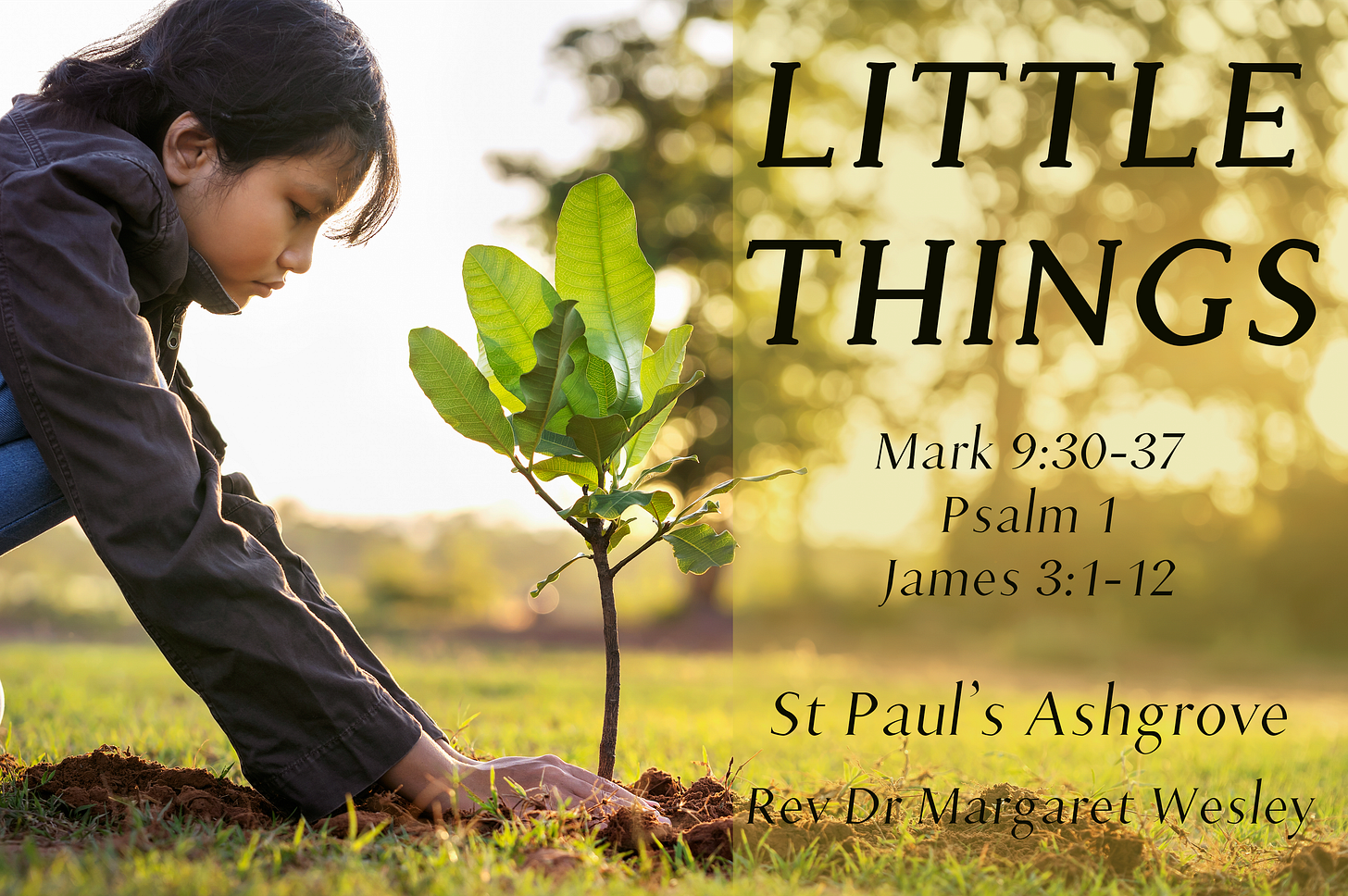Mark 9:30-37, Psalm 1 and James 3:1-12
So, the disciples have been arguing again! This time it is about who is the greatest. They were following Jesus on his way to Jerusalem to become king. The hopes, fears and ambitions that had brought each of them to that path took personal shape in each of their minds with the question: Which one of us will be his right hand man? Who is going to be his 2IC?
I usually send out my Sunday sermons on Saturday morning for St Paul’s people who won’t be able to get to church, and also for clergy friends who might be in need of sermon ideas. Please make use of anything that is useful for you and leave anything that is not. You will continue to receive emails in the Faith of our Mothers series each Tuesday.
Who is the greatest?
Who is the best?
And, as is always the case in every community, in every church, this desire to be the greatest broke down the sense of community among the disciples. And so, they were arguing among themselves.
Dietrich Bonhoeffer, who established an underground seminary in Germany during WWII when most of the churches had given in to Hitler, wrote a very wise little book called Life Together about that seminary community. He reflected on this argument among the disciples about who is greatest:
No Christian community ever comes together without this thought immediately emerging as a seed of discord. Thus at the very beginning of Christian fellowship there is ... an invisible, often unconscious, life-and death contest. “they had argued with one another”: this is enough to destroy a fellowship.
Isn’t it true that whenever there is a group of people, each person is looking for a place to stand in that group, a place to belong. And isn’t it true that normally we find that place by comparing ourselves with each other: am I older or younger, richer or poorer, more or less articulate, more or less likeable, am I making more or less of a mess of my life?
Those thoughts are pretty much instinctive and automatic, but when we give them power: when we start ranking ourselves and each other, community is destroyed.
When we are climbing the ladder of success, there is only space for one at a time on each rung. The only place for community, for spacious communion, is at the bottom of the ladder where Jesus is. Jesus came to be betrayed and to be killed. To be last. To be least.
People who have lived their life at the bottom of the ladder are delighted to find that Jesus is there with them. They don’t have to move to find Jesus. On the other hand, people who have spent their lives trying to get to the top find it very confronting to discover that Jesus is way down there… that if they want to be with Jesus then they are going to have to climb all the way back down.
That is confronting.
It goes against our programming and our striving.
It is a hard message to absorb. It needs to be rediscovered and re-learned many times through the Christian life.
So, Jesus placed a little child in front of them to help them understand. He said, “Whoever welcomes one such child in my name welcomes me.”
How we read this verse has changed a lot over time, depending on our society’s attitude to children. We live in a culture that adores children and esteems them very highly, at least in theory, and it is the greatest source of grief in Anglican churches today that there are so few children among us. Many Anglicans think that the absence of children among us signals failure in our mission. Children are held up high as symbols of success for Anglicans.
It was very different in Jesus’ day. Though parents loved their own children, of course, little children were not seen as having any status at all. They consumed resources and didn’t produce anything. The little child Jesus brought into the circle of disciples had not even set one foot on the first rung of the ladder of success. This was someone at the bottom. Where Jesus is.
Our society thinks very differently about children now, so if Jesus were among us, it would not be a child that Jesus would point to. Children have too much status in our society to be a useful illustration to challenge the disciples’ obsession with being the greatest.
Who or what do you think he might point them towards in our time?
***
That is a good question to ponder, isn’t it? Reflecting on that question can help us uncover the tendencies in our society to rank people from lowest to highest.
Might it be an elderly person?
Or an unhoused person?
Or a refugee?
Or someone with debilitating mental or physical health struggles?
Or might it not be a human at all?
Perhaps he would challenge our assumption that humans are all-important and tell them to be more like a tree?
Trees are carelessly cleared away to make space for development, for progress. We know them to be necessary in theory, and we may think they are beautiful, but we don’t want them getting in the way of our plans or our view. For all we know about them being necessary for life, we insist on relating to on our own terms. Trees are without status and without rights.
As I was thinking along these lines, the app I have been using for my morning prayer times – the Season of Creation app – reminded me of a Henry Lawson poem that makes the same point.
Don’t you love it when God does that?
Here it is:
The Stringy-Bark Tree
Henry Lawson, 1905
There's the whitebox and pine on the ridges afar,
Where the iron-bark, blue-gum, and peppermint are;
There is many another, but dearest to me,
And the king of them all was the stringy-bark tree.
Then of stringy-bark slabs were the walls of the hut,
And from stringy-bark saplings the rafters were cut;
And the roof that long sheltered my brothers and me
Was of broad sheets of bark from the stringy-bark tree.
And when sawn-timber homes were built out in the West,
Then for walls and for ceilings its wood was the best;
And for shingles and palings to last while men be,
There was nothing on earth like the stringy-bark tree.
Far up the long gullies the timber-trucks went,
Over tracks that seemed hopeless, by bark hut and tent;
And the gaunt timber-finder, who rode at his ease,
Led them on to a gully of stringy-bark trees.
Now still from the ridges, by ways that are dark,
Come the shingles and palings they call stringy-bark;
Though you ride through long gullies a twelve months you'll see
But the old whitened stumps of the stringy-bark tree.
No-one wants to be like a tree: indispensable for life yet without status in yourself. But that is exactly who Jesus placed before the disciples as an example.
Just as Jesus said “Be like a child”, the book of Psalms begins with: “Be like a tree”. In the very first Psalm, trees are taken as a model for the life of faith. Be like a tree, it says, roots planted firmly in the ground of God’s wisdom; drinking deeply of God’s goodness so you might stand firm in a time of scarcity and opposition; with branches that sway in the wind while the trunk holds steady.
If you want to be a success – to fulfil your destiny as a human being made in God’s image – don’t compete with each other for places of honour. Instead, model yourselves on someone without honour or status. Be like a tree.
In our day, we understand as never before that little things are important: as we begin to rediscover how interconnected everything is. The extinction of a seemingly insignificant species can have an unpredictable cascade effect across a whole ecosystem.
And in Queensland we are particularly aware that measures humans take to control our environment – even through little things like cane toads – can have unexpected and catastrophic consequences.
With that understanding, we are finding new dimensions to what Jesus said about letting the smallest among us be our guide.
The Bluefin Tuna population was becoming alarmingly low in the late 20th century due to overfishing. Since then, close monitoring or the species and measures to address overfishing have brought the population back to a safe level. That’s good news if you are a Bluefin Tuna. And that is sufficient reason to do it – for us humans who are created by God to be caretakers and custodians of creation, preserving species - preventing extinction is obviously a high priority.
It is worth doing for its own sake, but also because we know that Bluefins keep the population of smaller fish under control which, in turn, maintains the balance of plankton and other micro-organisms that keep our oceans healthy. And healthy oceans sustain all life on earth, including human life.
Little things are important. As the reading from James reinforces. A ship can be controlled by a little rudder. A bushfire can be started by a little spark.
Little things are important. Just as the tongue is a small part of the human body yet it has more potential for good or ill than almost any other part. And haven’t we seen how true that is in our time! What has been the greatest impediment to action on climate change over the past half century? Propaganda, disinformation, politicisation, polarisation – all keeping us so bogged down in conflict that we have been unable to address the real issues. The human tongue – or pen or computer keyboard – little things that have caused incalculable harm.
We cause harm when we get caught up in competition over who is the greatest – like the disciples in the Gospel story. My needs are more important than the needs of people living on small islands in the Pacific. The returns on my investments are more important, my rights are more important. If I am the greatest, then the needs of lesser beings matter less than my needs.
But if we set aside the quest for greatness, if we are willing to let the little things of this world be our guide (things like fish and trees and children) then, paradoxically, we will be ready to become something that truly is great: human beings fulfilling our calling to be caretakers of creation; who welcome Jesus every time we show hospitality to a child or a tree or an ocean; people who welcome the creator whenever we act in the interests of future generations rather than just in our own interests.
And that is how we will keep facing the existential threats to our world. By loving the little things and the little people. By keeping the little things in view and remembering that the way we treat the least significant one among us will be experienced by Jesus as treatment of him.
When we strive to be great, we create conflict by pushing others down and pushing others aside so that we can get to the top of the ladder. But when we stop caring about all that – when we climb down the ladder, we find Jesus among the little ones at the base. Amen.
With Love from Rev Margaret





